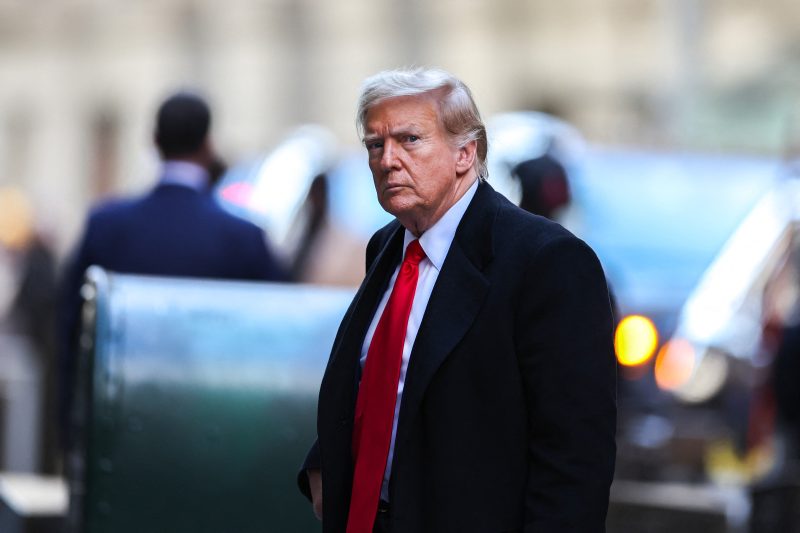Lazarus Group Targets LinkedIn Users, Impersonates Fenbushi Capital Executive: SlowMist
Trump’s first — and maybe only — trial is still viewed with skepticism


Next week, a former president of the United States is for the first time scheduled to go on trial for criminal charges. Donald Trump has been charged with 34 counts of falsifying business records by a Manhattan grand jury — a case that is complicated and (probably relatedly) viewed with skepticism by a lot of Americans.
It also may end up being the only indictment Trump faces that goes to trial.
It’s been the case for some time that, of those four indictments, the one in Manhattan is viewed by Americans broadly as the most dubious. Polling from the Associated Press, conducted by NORC, found that perceptions Trump had violated the law in the Manhattan case had declined throughout 2023, driven by increased Democratic skepticism.
That continues to be the case. In polling released this week by Ipsos (on behalf of Reuters), Americans were least likely to say that the Manhattan charges — unlike the federal charges in D.C. and Florida or the charges in Georgia — were very or somewhat serious. Only a little over a third of respondents indicated that they thought the Manhattan charges were very serious.
One likely reason for this is inadvertently revealed in the poll’s question: The Manhattan case, unlike, say, trying to overturn the 2020 election, is complicated.
Trump is accused of creating falsified business documents, for having payments to his then-attorney Michael Cohen recorded as a legal retainer. In reality, the money was meant to reimburse Cohen for having paid $130,000 to adult film actress Stormy Daniels, whose real name is Stephanie Clifford, which prosecutors say was to keep her from publicly revealing a sexual encounter she said she had with Trump years earlier. Cohen admitted to the payment and to making it to aid Trump’s campaign, a violation of campaign-finance laws. And since the alleged falsified records were in service of covering up another crime, the Manhattan charges are a felony.
There was another payment in the same period to Playboy model Karen McDougal. That one was covered by the parent company of the National Enquirer, on Trump’s behalf. But it is not part of the Manhattan charges, despite the Ipsos question’s wording.
The other obvious factor here is partisanship. Republicans are overwhelmingly less likely to describe the charges Trump faces as serious, regardless of which charge is at issue. Only a quarter of Republicans say the charges centered on trying to overturn the 2020 election are very serious.
What’s more, Republicans consistently told Ipsos that descriptions of the underlying crimes (at times inaccurate descriptions) were not particularly believable. Only a third of Republicans, for example, said it was very or somewhat believable that Trump illegally removed classified documents from the White House and took them to his Mar-a-Lago estate. Interestingly, the hush money payoffs — only one of which was ultimately paid by Trump — were most consistently described as believable.
Instead, Republicans were far more likely to view the entire effort to charge Trump as politically motivated.
How complicated are the Manhattan charges? On Wednesday, Trump attempted to portray them as somehow subverted by a statement Daniels released in early 2018 denying having a relationship with Trump — a statement that was the direct fruit of the coverup for which he paid the $130,000! It was the hush that earned the money, but many of his supporters took for granted that this statement was somehow important. (Daniels later retracted it.)
Part of this may stem from something revealed earlier this year in polling conducted by YouGov: Many Republicans simply aren’t familiar with the details of the indictments and settlements centered on Trump. (That poll included intentionally false claims about Trump’s actions to gauge how often people were simply responding based on their views of Trump.)
This is undoubtedly related to the disparagement of the indictments within the right-wing media bubble and to a disinterest in learning about the charges among Trump supporters.
That said, though, there’s also another factor worth considering: A healthy chunk of Trump’s base believes he has committed serious federal crimes — and supports him for president anyway.
Most Republicans simply think that all of this is political, a point of view that Trump has promoted ceaselessly since even before he took office. They think Trump’s opponents are trying to block his path to the presidency or, that they want to punish him. Many appear to believe that Trump’s actions are unexceptional, a belief that special counsel Jack Smith, originator of two of the Trump indictments, explicitly rejected in a filing this week.
That the first criminal case in which Trump will participate is the one that is viewed as less than very serious by most Americans may not disabuse them of that perception. Or, perhaps, something else will happen: Americans will better understand what Trump did and why, and their views of his actions will shift.
If they learn about the trial at all, that is.











